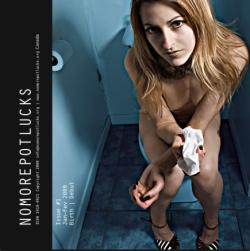“Anyone can do what we’re doing,” claims editor Mél Hogan of the No More Potlucks project. “We’re all self-taught.”
Okay, in theory, anyone could conduct interviews, commission articles, set up archives, upload videos, figure out how to use a content management system, and learn magazine layout. In theory. But not just anyone has the energy and audacity to launch a visually stunning, intellectually meaty, dynamic, bilingual online journal, complete with more than 70 hours of archived Dykes on Mykes radio podcasts.
No More Potlucks is the love child of a team of passionate, dedicated volunteers whose self-stated goal is to “redefine culture with each issue.” Transformed from the old No More Potlucks site, which was primarily a Montreal-based, queer events calendar, the new site offers multimedia content curated around a theme.
“We don’t have a mandate,” Hogan explains. “We decided not to have a specific group that we’re targeting, or a specific way of being, or reflect a certain politic. It’s all about ‘mostly.’ It’s going to reflect who’s working on it in a big way. It’s mostly Canadian, mostly French and English, mostly women, mostly about arts and politics and culture.”
For the first issue, “Début | Birth,” the editors cashed in favours to handpick big name contributors such as Mary K Bryson, Julie Doucet, Allyson Mitchell and Catherine Opie. Initially worried about scrounging up three articles, Hogan had to redesign the site to accommodate between 12 and 15 articles per issue.
If reading online isn’t your thing, you can order No More Potlucks as a full-colour hard copy, available a few weeks after each online issue launches. “This is something we could only do now, maybe in the last couple of years,” Hogan states of the print-on-demand technology that enables NMP to print as many, or as few, copies of the journal as readers want.
“When the next issue comes up, you don’t have access to this one anymore, unless you subscribe,” Hogan says. “But print issues you can order anytime.”
“If this is what we can do with nothing,” editor Danya McLeod says, “imagine what we could do with a budget.”
Right now, expenses like server fees and back-up hard drives come out of pocket or are covered by fundraisers. Readers can support the project by subscribing or making a donation.
“Obviously, we’re not doing it for the money,” McLeod says. “At all. Ever. But it would be really great to be able to pay the contributors.”
Contributors, the team hopes, will come from across Canada and beyond. The site’s equipped to handle video, audio and textual submissions and encourages people to send stuff in, or at the very least, comment and start discussions.
“In none of our promo or the editorial has there been a mention of the word queer,” Hogan says, when asked if NMP is a queer project. “People who’ve read it in a certain way have definitely defined it that way, but in terms of the stuff we’ve sent out, it’s obviously very queer, it’s obviously very feminist. So then, why say it?”
“Or limit contribution,” McLeod adds. “Because as soon as you say, ‘It’s about this or that,’ that’s going to limit what comes in.”
“Ironically, it’s like putting one version of queer politics into practice, whereby your identity is much more complex than just your sexual orientation, just your background, just your education, just your whatever,” Hogan says. “You know the LGBTQ squared alphabet soup? We’re just not interested in making those lists. But they’re there for a reason and we’ve learned from them. We’re admitting that that has informed the way we do things. We’re just taking the next step.”
And what is that next step?
“We don’t really know,” she admits. “That’ll probably get us into trouble. We’re still responsible, we’re still accountable, we’re still making choices about who we’re representing and how. And fair enough. It’s a risk worth taking.”

 Why you can trust Xtra
Why you can trust Xtra


